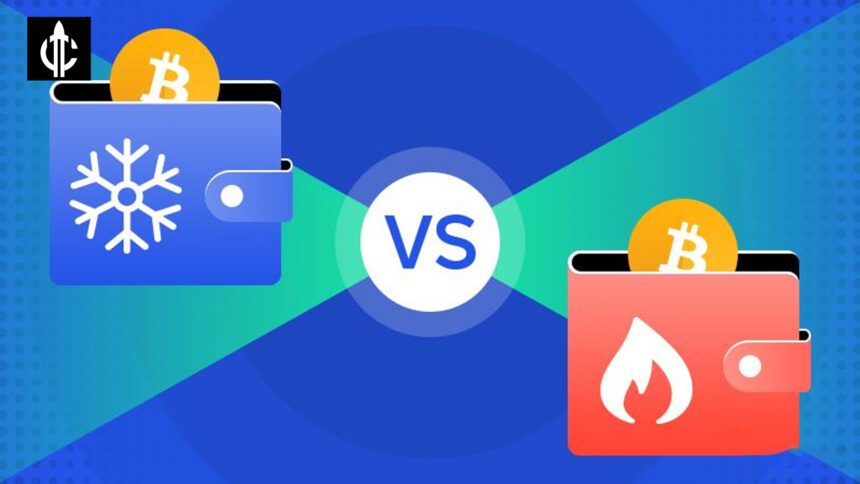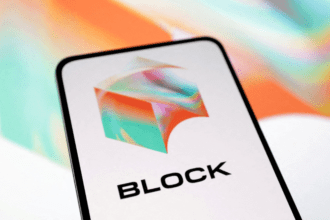In the world of cryptocurrency, choosing between hot wallets and cold wallets is key. It affects the security and ease of access to your digital assets. This guide will help you understand the main differences between these two wallet types. You’ll learn which one fits your needs and investment strategy best.
We’ll explore the unique features of hot wallets and cold wallets. You’ll see how each offers advantages and disadvantages. Knowing these differences helps you make a choice that matches your priorities and risk level.
Key Takeaways
- Hot wallets offer convenience and accessibility, but face higher security risks.
- Cold wallets provide enhanced security through offline storage, but may be less convenient.
- Factors such as investment size, transaction frequency, and security concerns should guide your wallet choice.
- Proper storage and management of private keys are critical for your digital assets’ safety.
- Learning about the differences between hot and cold wallets is vital for making an informed choice.
Understanding Cryptocurrency Wallets
Cryptocurrency wallets are key for keeping your digital assets safe. They come in different types, each with its own benefits and drawbacks. We’ll look at the main two: hot wallets and cold wallets.
What Are Hot Wallets?
Hot wallets are software-based and always online. They’re great for everyday use because they’re easy to access. You can use them on your phone, computer, or through a web browser.
They make quick and easy transactions. This is why many people choose them for daily use.
What Are Cold Wallets?
Cold wallets, on the other hand, are hardware or offline solutions. They offer better security for your crypto. Your private keys stay offline, making them safer from hackers.
They’re also known as “hardware wallets” or “paper wallets.” These are the safest for storing a lot of crypto for a long time.
| Hot Wallets | Cold Wallets |
|---|---|
| Connected to the internet | Offline storage |
| Convenient for daily transactions | Enhanced security for long-term storage |
| Vulnerable to online threats | Protected from online threats |
| Suitable for smaller cryptocurrency holdings | Suitable for larger cryptocurrency holdings |
It’s important to know the difference between hot and cold wallets for safe crypto management. Next, we’ll explore the good and bad of each to help you decide.
Hot Wallets vs Cold Wallets
Choosing between hot wallets and cold wallets is key for keeping your cryptocurrency safe. Each type has its own benefits and drawbacks. Knowing the differences helps you pick the right one for you.
Hot wallets, or online wallets, are always connected to the internet. They’re easy to use and manage your crypto. But, they’re also at risk of hacking because they’re always online.
Cold wallets, or hardware wallets, are physical and keep your private keys offline. They’re much safer because they’re not connected to the internet. They’re great for keeping your crypto safe for a long time, but not so good for quick transactions.
| Feature | Hot Wallets | Cold Wallets |
|---|---|---|
| Security | Lower | Higher |
| Accessibility | Higher | Lower |
| Convenience | Higher | Lower |
| Suitable for | Frequent transactions | Long-term storage |
Deciding between hot wallets and cold wallets depends on what you value most. Do you want security or ease of use? Knowing the pros and cons helps you choose the best option for your needs.
Advantages of Hot Wallets
Hot wallets are great for managing digital assets. They offer convenient cryptocurrency storage and accessible cryptocurrency transactions. This makes them a top choice for many crypto fans.
Convenience and Accessibility
Hot wallets are super easy to use. You can start managing your cryptocurrencies in just a few minutes. They let you access your funds from anywhere with an internet connection.
Seamless Transactions
Hot wallets advantages include easy transactions. They work well with many exchanges and payment platforms. This makes buying, selling, and transferring digital assets simple.
Hot wallets are perfect for those who want to manage their convenient cryptocurrency storage and accessible cryptocurrency transactions easily. They’re great for both new and experienced crypto investors.
Disadvantages of Hot Wallets
Hot wallets are easy to use and always connected. But, they also have big security risks. Because they’re online, they can be hacked, stolen, and exposed to cyber threats. If the wallet or device gets hacked, your private keys and digital assets could be lost.
Security Risks
One big disadvantage of hot wallets is the security risks they bring. Being always online makes them easy targets for online wallet vulnerabilities and security breaches. This puts your private keys and digital assets at risk of being stolen or lost.
- Hot wallets are more vulnerable to hacking and cyber attacks because they’re always online.
- If the hot wallet provider or the device hosting the wallet is compromised, your funds could be at risk.
- The convenience of hot wallets comes at the cost of reduced security compared to cold wallets.
“The convenience of hot wallets is often overshadowed by the increased security risks they pose. It’s important to carefully weigh the pros and cons when choosing a cryptocurrency wallet.”
To lower these security risks, it’s key to use strong security steps. This includes using two-factor authentication, backing up your wallet, and keeping your device and software updated. Or, you might want to think about using a cold wallet for safer storage of your digital assets.
Advantages of Cold Wallets
Cold wallets are great for keeping your digital assets safe. They offer enhanced security compared to hot wallets. This is because they store your private keys offline, making them less vulnerable to online attacks.
Another big plus is their offline storage. Your cryptocurrency is kept on a physical device, like a hardware wallet. This keeps it safe from the internet, reducing the chance of theft. It’s why people choose cold wallets for long-term storage and valuable assets.
Cold wallets also have advanced security features. They use strong encryption and designs that show if someone has tried to tamper with them. This protects your private keys, even if the wallet is lost or stolen. It’s a big deal for those with a lot of cryptocurrency or who make big transactions.
“Cold wallets provide the ultimate in security for your digital assets, keeping your private keys safely offline and out of the reach of online threats.”
In summary, cold wallets are a top choice for keeping your cryptocurrency safe. They offer enhanced security and offline storage. This means you can rest easy knowing your digital assets are well-protected against cyber threats.
Disadvantages of Cold Wallets
Cold wallets are great for keeping our digital assets safe. But, they also have some downsides. The main issues are how inconvenient they are, how hard they are to get to, and how slow transactions can be.
One big problem with cold wallets is how hard they are to use. They are physical devices that we have to hold. This makes it harder to get to our money compared to hot wallets. It’s a big issue for people who need to use their money a lot or travel a lot.
Another issue is that cold wallets are hard to get to when we’re not at home. Because they’re not online, we can’t use them from anywhere or on different devices. This is a big problem for people who need to manage their money from different places.
Also, using cold wallets to send and receive money is slower and more complicated. Transactions take longer because we have to plug the device into a computer to start them. This can be a big problem for people who need to make quick or urgent transactions.
“The inconvenience and limited accessibility of cold wallets can be a significant drawback for users who need frequent access to their digital assets or who value the ability to manage their funds from multiple devices.”
Even though cold wallets offer better security, their cold wallets disadvantages are important to think about. The inconvenience, limited accessibility, and slow transactions are key things to consider when choosing a wallet.
Hot Wallets: Types and Examples
Hot wallets are a favorite for their ease and quick access. They come in many forms, each with special features. Let’s look at the different types and give examples to help you choose.
Web Wallets
Web wallets let you use your digital assets from any device with internet. They are often found on cryptocurrency exchanges or online platforms. They are easy to use and make transactions smooth. Some examples are Coinbase Wallet, Metamask, and MyEtherWallet.
Mobile Wallets
Mobile wallets are great for managing your crypto on the go. They work on smartphones and are safe for storing, sending, and receiving digital assets. Popular ones include Trust Wallet, Exodus, and Atomic Wallet.
Desktop Wallets
Desktop wallets are software you install on your computer. They are more secure than web wallets because they’re not always online. Examples are Electrum, Jaxx Liberty, and Atomic Wallet.
Choosing a hot wallet means picking one that’s secure and reliable. Remember, hot wallets are online, so they face more security risks. To stay safe, use strong security and think about using a cold wallet for long-term storage.
Cold Wallets: Types and Examples
Cold wallets are a strong way to keep your cryptocurrency safe. They are offline storage devices that protect your digital assets from online threats. There are two main types: hardware wallets and paper wallets.
Hardware Wallets
Hardware wallets are physical devices that store your private keys offline. They are small, tamper-resistant, and very secure. By keeping your keys offline, they prevent hacking or theft.
Popular brands like Ledger and Trezor are trusted by many. They offer a safe way to store your cryptocurrencies.
Paper Wallets
Paper wallets are a simple, yet secure, way to store your cryptocurrency. You print your private keys and public address on paper. This keeps your assets safe from online threats.
While not as easy to use as hardware wallets, paper wallets are great for long-term storage. They are a low-cost, offline solution.
| Type of Cold Wallet | Pros | Cons |
|---|---|---|
| Hardware Wallets | Highly secure offline storage Tamper-resistant design Convenient for everyday transactions | Require an upfront investment May have a learning curve for some users |
| Paper Wallets | Extremely secure offline storage Low-cost solution Suitable for long-term storage | Less convenient for frequent transactions Require careful handling and storage |
Choosing between a hardware wallet or a paper wallet depends on your needs. Both offer strong protection for your cryptocurrency. Knowing the differences helps you make the best choice for your digital assets.
Choosing the Right Wallet
Choosing the right cryptocurrency wallet involves several important factors. Whether you prefer a hot wallet or a cold wallet, your choice should match your security needs and trading habits. It also depends on the digital assets you own. Let’s look at the key points to consider when picking the perfect wallet for your journey with cryptocurrency.
Evaluating Security and Accessibility
Security is the top thing to think about when picking a wallet. Hot wallets, which are online, are easy to use but riskier. Cold wallets, which stay offline, are safer but less convenient. Think about how much security you need versus how easy you want it to be to use your wallet.
Aligning with Your Investment Strategy
Your investment plan and the value of your digital assets matter too. If you trade a lot and have a big portfolio, a hot wallet might be better. It lets you make quick trades. But, if you hold onto your assets for a long time, a cold wallet could be safer for them.
Considering Wallet Complexity
How easy or hard it is to manage a wallet is also important. Cold wallets need more setup and upkeep, which can be tricky. If you don’t want to deal with that, a hot wallet might be easier to handle.
By thinking about these factors, you can pick a wallet that fits your needs. It’s all about finding the right balance between security, ease of use, and your investment style.
Security Best Practices
Keeping your cryptocurrency safe is very important, no matter the wallet type. To protect your digital assets for the long term, follow some key steps. These steps focus on keeping your private keys safe and managing your wallet well.
One key step is to keep your private keys safe and offline. Don’t store them online or on devices connected to the internet. This is because they can be hacked. Instead, use a hardware wallet or a paper wallet for safer storage.
It’s also important to back up your wallet regularly. Having many backup copies of your private keys helps protect your assets. This is useful in case of a hardware failure or other unexpected problems.
Being careful about phishing attacks and other threats is also vital. Watch out for suspicious emails, messages, or websites that might try to steal your info. Always check if a message or website is real before sharing any sensitive details.
By following these best practices for private key management and wallet security, you can greatly improve your cryptocurrency’s safety. This helps reduce the risks of storing digital assets.
| Security Measure | Description |
|---|---|
| Private Key Protection | Store private keys securely offline using hardware or paper wallets |
| Regular Backups | Create and store multiple backup copies of your private keys |
| Vigilance Against Threats | Be cautious of phishing attempts and verify the authenticity of any communication or website |
“Securing your cryptocurrency wallet is not just a matter of convenience, but a critical step in protecting your digital assets from possible threats.”
Conclusion
In our look at hot wallets vs. cold wallets, we see it’s a tough choice. It’s about finding a balance between ease and safety. Hot wallets are great for quick transactions and are loved by many users.
Cold wallets, on the other hand, are better for keeping your assets safe for a long time. They’re perfect for those who want to protect their investments.
Choosing the right wallet depends on your needs and how you invest. Whether you pick a hot or cold wallet, keeping your assets safe is key. Always follow the best practices for storing and managing your cryptocurrencies.
The world of cryptocurrencies is always changing. It’s important to keep up and adjust your wallet choices as needed. By knowing the differences between hot and cold wallets, we can make smart choices. This helps us protect and grow our digital assets over time.
Join Our Telegram Free Channel for Free Crypto Singals and Charts: t.me/coinextoday
FAQ
What are the key differences between hot wallets and cold wallets?
Hot wallets are software-based and online, making transactions easy. Cold wallets are hardware or offline, focusing on security. They keep your private keys safe from the internet.
What are the advantages of hot wallets?
Hot wallets are easy to use and fast for transactions. They’re perfect for daily use and trading. You can quickly access your digital assets.
What are the disadvantages of hot wallets?
Hot wallets face security risks because they’re online. They’re more likely to be hacked. Your private keys and assets could be stolen if the wallet is compromised.
What are the advantages of cold wallets?
Cold wallets are secure and keep your assets offline. They’re less likely to be hacked. They’re great for long-term storage and protecting valuable assets.
What are the disadvantages of cold wallets?
Cold wallets are less convenient than hot wallets. They’re slower for transactions and harder to use. You need to have them physically to access your assets.
What are the different types of hot wallets?
Hot wallets include web, mobile, and desktop wallets. Web wallets are online and easy to access. Mobile wallets work on phones for quick management. Desktop wallets are safer than web wallets.
What are the different types of cold wallets?
Cold wallets are hardware or paper-based. Hardware wallets are physical and protect your keys offline. Paper wallets print your keys and address on paper for offline storage.
What factors should I consider when choosing the right cryptocurrency wallet?
Think about your security needs and how you trade. Consider the convenience and security of hot and cold wallets. Choose based on your investment goals and asset value.
What are some security best practices for cryptocurrency wallets?
Always keep your private keys safe and back up your wallet. Be careful of phishing and other threats. Good wallet management and security practices protect your investments.








